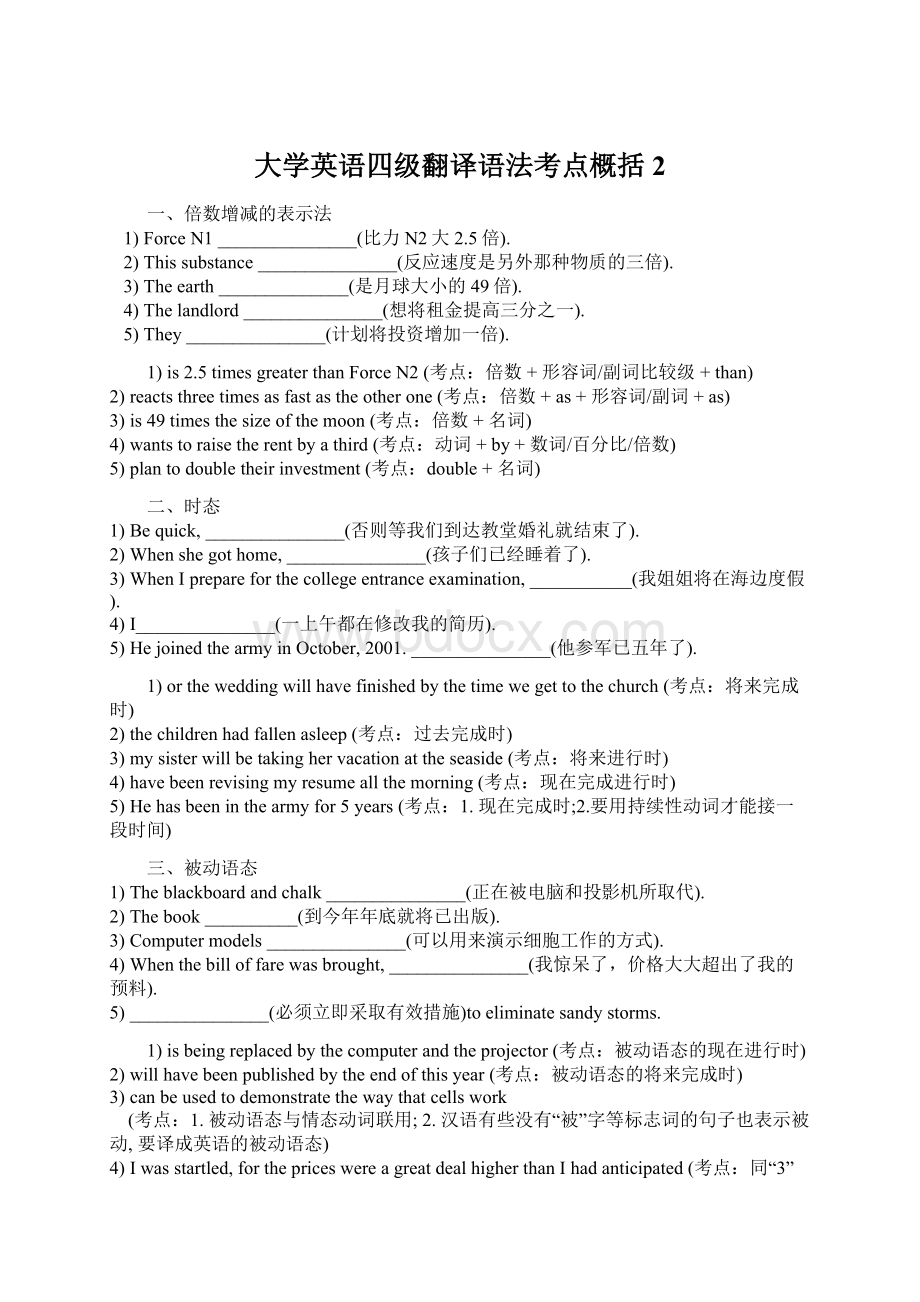大学英语四级翻译语法考点概括 2Word下载.docx
《大学英语四级翻译语法考点概括 2Word下载.docx》由会员分享,可在线阅读,更多相关《大学英语四级翻译语法考点概括 2Word下载.docx(9页珍藏版)》请在冰豆网上搜索。

二、时态
1)Bequick,_______________(否则等我们到达教堂婚礼就结束了).
2)Whenshegothome,_______________(孩子们已经睡着了).
3)WhenIprepareforthecollegeentranceexamination,___________(我姐姐将在海边度假).
4)I_______________(一上午都在修改我的简历).
5)HejoinedthearmyinOctober,2001._______________(他参军已五年了).
1)ortheweddingwillhavefinishedbythetimewegettothechurch(考点:
将来完成时)
2)thechildrenhadfallenasleep(考点:
过去完成时)
3)mysisterwillbetakinghervacationattheseaside(考点:
将来进行时)
4)havebeenrevisingmyresumeallthemorning(考点:
现在完成进行时)
5)Hehasbeeninthearmyfor5years(考点:
1.现在完成时;
2.要用持续性动词才能接一段时间)
三、被动语态
1)Theblackboardandchalk_______________(正在被电脑和投影机所取代).
2)Thebook__________(到今年年底就将已出版).
3)Computermodels_______________(可以用来演示细胞工作的方式).
4)Whenthebilloffarewasbrought,_______________(我惊呆了,价格大大超出了我的预料).
5)_______________(必须立即采取有效措施)toeliminatesandystorms.
1)isbeingreplacedbythecomputerandtheprojector(考点:
被动语态的现在进行时)
2)willhavebeenpublishedbytheendofthisyear(考点:
被动语态的将来完成时)
3)canbeusedtodemonstratethewaythatcellswork
(考点:
1.被动语态与情态动词联用;
2.汉语有些没有“被”字等标志词的句子也表示被动,要译成英语的被动语态)
4)Iwasstartled,forthepriceswereagreatdealhigherthanIhadanticipated(考点:
同“3”的考点2)
5)Effectivemeasuresmustbetakenimmediately(考点:
汉语的无主句通常翻译成英语的被动语态)
四、情态动词
1)Thephoneisringing,_______________(但是没人接听。
她一定不在家).
2)Ican’tfindmysunglasses._______________(我可能昨天落在咖啡店里了).
3)Youscreamedinyoursleeplastnight.______________(你一定梦见什么可怕的东西了).
4)It’sapity._______________(你本应该邀请她来参加你的毕业典礼的).
5)_______________(其实我没必要穿上我最好的套装去参加那次聚会的);
mostoftheguestswerewearingjeansandsweaters.
1)butthereisnoanswer.Shecan’tbeathome(考点:
情态动词可表示可能性,can’t表示“一定不”)
2)Imayhavelefttheminthecoffeeshopyesterday
“情态动词can/could,may/might,must+完成式”用于表示对过去发生的动作的主观判断)
3)Youmusthavedreamedofsomethingterrible(考点:
同上)
4)Youshouldhaveinvitedhertoyourgraduationceremony(考点:
“情态动词should/oughtto+havedone”用于评论过去应该做而实际并未做的动作,含有批评的意思)
5)Ineedn’thaveputonmybestsuittogototheparty(考点:
“情态动词needn’t+have+done”表示对过去发生的动作进行评论,认为“无须发生”,“不必做”)
五、虚拟语气
1)Iwish_______________(我年轻的时候有你们这样的机会).
2)Ifonly_______________(他知道这病是可以治好的)!
Thenhewouldnothavekilledhimself.
3)——Wouldyoulikehimtopaintyourdoorwithyellowstars?
——I’dratherhe_______________(漆成蓝色的,而且不带任何装饰).
4)It’shightimethat_______________(采取措施解决交通堵塞的问题).
5)Hughusuallytalks_______________(仿佛在大会上发表演说似的).
6)Weinsistthat___________(让杰克立刻进医院).
7)Itwasadvisedthat_______________(在居民区设立更多的流动商店).
8)Hisproposalwasthat_______________(他们成立一个专门委员会来检查这个问题).
9)Wearegoingtodiscusshissuggestionthat_______________(取消期中考试).
10)Itisridiculousthat_______________(我们在一个总是下雨的国家还缺水).
11)Itisessentialthat_______________(每个人都为紧急情况做好准备).
12)____________(如果他按照我告诉他的办法订票),wewouldhavehadquiteacomfortablejourney.
13)Iwastohavemadeaspeech_______________(要不是有人把我的话打断了).
14)Itdidn’trainlastnight._______________(要是下了,地就会湿的).
15)_______________(如果我一直住在纽约),IwouldknowtheU.S.wellnow.
16)Ifthedoctorhadnotcomeintime,_______________(他现在就不在人间了).
17)Butforhishelp,_______________(我们就不会以这么低的价格租到房子了).
18)Iusedmycalculator;
_______________(否则,我会花更长的时间才能算出这道题).
19)WereIinyourplace,_______________(我会毫不犹豫地抓住机会).
20)Haditnotbeenfortheiropposition,_______________(这项法案早就通过了).
21)Shouldtherebeanotherworldwar,_______________(人类的继续存在就会有危险).
22)Hewalkedlightly_______________(以免惊醒婴儿).
1)IhadhadyouropportunitieswhenIwasyoung
Iwish后的that从句中用过去完成式表示过去没有实现或不可能实现的愿望)
2)hehadknownthisdiseaseiscurable
Ifonly引导的感叹句表示“但愿”或“要是……就好了”,用法与Iwish…基本相同)
3)painteditblue,andwithoutanydecorations
wouldrather后的that从句中用过去式表示不是事实)
4)measuresweretakentosolvetheproblemoftrafficjams
It’s(about/high)time后的that从句中用过去式,表示“该是……的时候了”)
5)asthoughheweredeliveringaspeechatanassembly
asif/asthough引导的从句中用过去式表示和现在事实相反或对现在情况有所怀疑)
6)Jack(should)besenttohospitalrightnow(考点:
表示“建议、命令、要求、想法”的动词所接的宾语从句通常用“(that)sb.(should)do”的虚拟形式)
7)moremobileshops(should)besetupintheresidentialarea(考点:
表示“建议、命令、要求、想法”的动词所接的主语从句通常用“(that)sb.(should)do”的虚拟形式)
8)they(should)setupaspecialboard/committeetoexaminethisproblem(考点:
表示“建议、命令、要求、想法”的名词所接的表语从句通常用“(that)sb.(should)do”的虚拟形式)
9)themid-termexams(should)becanceled(考点:
表示“建议、命令、要求、想法”的名词所接的同位语从句通常用“(that)sb.(should)do”的虚拟形式)
[表示“建议、命令、要求、想法”的动词及其名词常见的有:
advise(advice),agree(agreement),decide(decision),decree,demand,determine(determination),grant,indicate(indication),insist(insistence),order,prefer(preference),propose(proposal),request,require(requirement),resolve(resolution),stipulate(stipulation),suggest(suggestion),urge,vote;
常见的这类动词还有:
allow,arrange,ask,beg,concede,demonstrate,ensure,intend,move,pledge,pray等]
10)we(should)beshortofwaterinacountrywhereitisalwaysraining
在Itis/was+形容词后的that从句中常用“sb.shoulddo”的形式表示建议惊奇等。
这类形容词常见的有:
advisable,anxious,appropriate,compulsory,crucial,desirable,eager,essential,fitting,imperative,important,impossible,improper,natural,necessary,obligatory,preferable,proper,urgent,vital,willing等)
11)everyone(should)bepreparedforemergency(考点:
12)IfhehadbookedticketsinthewayItoldhim
在非真实条件句中用过去完成式表示与过去的事实相反)
13)ifIhadnotbeeninterrupted(考点:
14)Ifithadrained,thegroundwouldbewet(考点:
在非真实条件句中,当主句与从句表示的动作不是同时发生时,就根据情况用适当的谓语动词形式)
15)IfIhadbeenlivinginNewYork(考点:
16)hewouldbedeadnow(考点:
17)wecouldnothaverentahouseatsuchalowprice
butfor经常作为非真实条件句中if的代用语)
18)otherwise,itwouldhavetakenmemoretimetoworkoutthisquestion
otherwise也经常作为非真实条件句中if的代用语)
19)Iwouldseizetheopportunitywithouthesitation(考点:
在非真实条件句中如果有were,had,
should这三个词,可以省去if,采用主谓语倒装的形式来表示条件)
20)thisactwouldhavebeenpassedmuchearlier(考点:
21)thecontinuedexistenceofthehumanracewouldbeinjeopardy(考点:
22)lestheshouldawakenthebaby(考点:
lest(以免)引导的从句通常用sb.shoulddo的形式表示虚拟)
六、不定式
1)Itwasagreatachievement_______________(10个月建成一栋24层的楼).
2)Itisnecessary_______________(我们在考试前好好地睡一晚上觉).
3)Itisgenerous_______________(你把这么多钱捐给灾区人民).
4)Theteacherdecided_______________(不惩罚那些上课迟到的学生).
5)Mr.Greenwaswondering_______________(是否去看望在法国的儿子).
6)Thegardener_______________(刚才警告我不要在中午给花浇水).
7)We_______________(请他给我们做有关现代艺术的讲座).
8)Hefeelsitchallenging_______________(在这么大一所大学做学生会主席).
9)Wehopetohavemoreopportunities_______________(把我们在课堂上学到的东西应用于实践).
10)Thebadweather_______________(破坏了我们在露天放电影的计划).
11)Theenvironmentalistsareagainst_______________(在郊区建一座核电站的决定).
12)SallyRidewasthefirst_______________(探索外部空间的美国妇女).
13)Theyliftedarock_______________(结果砸了自己的脚).
14)Hewassurprised_______________(在这个山村遇见一个中学同学).
15)Iamsorry_______________(占用了您这么多时间).
16)Ihappened_______________(在他冲进来的时候站在门口).
17)Shedoesn’tlike______________(被当作客人).
18)Ifyouwanttosavemoney,you’dbetter_______________(到校园书店买旧书).
19)Wedidnothing_______________(除了整天打桥牌).
20)Weweremade_______________(进屋之前在垫子上擦擦脚).
1)tocompletea24-storybuildingin10months
不定式作主语时常用it作形式主语放在句首代替不定式,而将不定式移到谓语后面)
2)forustohaveagoodnight’ssleepbeforethetest
有时用“介词for+代词/名词”来表示不定式的逻辑主语,这时整句的谓语描述的对象是事情,这种情况下谓语中常用的形容词有:
necessary,important,possible,impossible,allright,essential等)
3)ofyoutodonatesomuchmoneytothepeopleinthedisasterarea
有时用“介词of+代词/名词”来表示不定式的逻辑主语,这时整句的谓语描述的对象是人,这种情况下谓语中常用的形容词有:
absurd,bold,brave,careful,careless,cowardly,cruel,foolish,generous,good,honest,kind,nice,polite,rude,selfish,silly,stupid,thoughtful,thoughtless,wicked,wise,wrong等)
4)nottopunishthosestudentswhohadbeenlateforclass
1.用不定式结构作decide的宾语;
2.不定式的否定形式是在to前加not)
(能带不定式作宾语的动词常见的有:
afford,agree,ask,attempt,beg,begin,bother,care,choose,claim,consent,decide,demand,desire,dislike,endeavor,expect,fail,fear,forget,happen,hate,help,hesitate,hope,intend,learn,like,love,manage,mean,neglect,offer,plan,pledge,prefer,prepare,pretend,promise,refuse,remember,resolve,start,threaten,undertake,venture,volunteer,vow,want,wish)
5)whethertovisittheirsoninFrance
“疑问词+不定式”作动词wonder的宾语。
能以这种结构作宾语的动词通常有ask,consider,decide,discover,explain,forget,guess,know,learn,observe,remember,see,tell,understand,wonder等)
6)warnedmejustnownottowaterflowersatnoon(考点:
不定式作宾语补语)
7)invitedhimtogiveusalectureonmodernart(考点:
(能带不定式结构作宾语补语的动词有advise,allow,ask,beg,cause,challenge,command,compel,enable,determine,encourage,expect,feel,find,force,get,hate,have,hear,help,informinvite,let,like,make,mean,need,notice,notify,oblige,order,permit,persuade,remind,request,require,see,send,teach,tell,tempt,trouble,urge,want,warn,watch,wish等。
注:
划线的动词后面的不定式不带to)
8)tobethechairmanofstudents’unioninsolargeauniversity
动词+it+形容词/名词+不定式。
it是形式宾语,不定式是真正宾语)
9)toapplywhatwehavelearnedinclasst